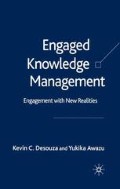Abstract
‘We live in a global world’ has become a cliché. More recently, we have also seen considerable interest in the term ‘distributed’, in the context of distributed work, distributed teams, and so on. A recent tragedy may help illustrate the critical issues of globalization. On September 11, 2001, the USA was attacked by the terrorist organization of Al Qaeda. The terrorists who hijacked the aircrafts resided in various geographical locations in the USA. The command-and-control centers for the coordinated attacks were based in the USA, Germany, Afghanistan, and Malaysia. The resources and skills required to carry out the attacks were garnered from multiple global locations. The success of the effort can be linked to the ability of the terrorists to blend into local cultures and go undetected by law enforcement officials. A wide assortment of communication tools were used to exchange the information and knowledge required to coordinate the attacks. Every aspect of the assault was global and distributed in nature.
Access this chapter
Tax calculation will be finalised at checkout
Purchases are for personal use only
Preview
Unable to display preview. Download preview PDF.
Notes
Grant, R. (1996). “Toward a Knowledge-Based theory of the Firm,” Strategic Management Journal, 17 (Special Issue), 109–22
Tsoukas, H. (1996). “The Firm as a Distributed Knowledge System: A Constructionist Approach,” Strategic Management Journal, 17, 11–25.
Hayek, F. (1945). “The Use of Knowledge in Society,” American Economic Review, 35 (4), 519–30, p. 520.
Ghoshal, S. and Bartlett, C. (1998). Managing across Borders. Boston, MA: Harvard Business School.
Gupta, A.K. and Govindarajan, V. (1991). “Knowledge Flows and The Structure of Control within Multinational Corporations,” Academy of Management Journal, 16 (4), 768–92
Gupta, A.K. and Govindarajan, V. (2000). “Knowledge Flows within Multinational Corporations,” Strategic Management Journal, 21 (4), 473–96.
Desouza, K.C. and Evaristo, J.R. (2003). “Global Knowledge Management Strategies,” European Management Journal, 21 (1), 62–7
Desouza, K.C. and Evaristo, J.R. (2004). “Managing Knowledge in Distributed Projects,” Communications of the ACM, 47 (4), 87–91.
Zeigler, C.A. (1985). “Innovation and the Imitative Entrepreneur,” Journal of Economic Behavior and Organization, 6 (2), 103–21.
Katz, R. and Allen, T.J. (1982). “Investigating the Not Invented Here (NIH) Syndrome: A Look at the Performance, Tenure and Communication Patterns of 50 R&D Projects Groups,” R&D Management, 12 (1), 7–19.
Michailova, S. and Husted, K. (2003). “Knowledge-Sharing Hostility in Russian Firms,” California Management Review, 45 (3), 59–77.
Evaristo, J.R. and Fenema, P.C.V. (1999). “A Typology of Project Management: Emergence and Evolution of New Forms,” International Journal of Project Management, 17 (5), 275–81.
Evaristo, J.R., Scudder, R., Desouza, K.C., and Sato, O. (2004). “A Dimensional Analysis of Geographically Distributed Project Teams: A case study,” Journal of Engineering and Technology Management, 21 (3), 175–89.
Desouza, K.C. and Evaristo, J.R. (2004). “Managing Knowledge in Distributed Projects,” Communications of the ACM, 47 (4), 87–91.
Awazu, Y., Desouza, K.C. and Evaristo, J.R. (2004). “Stopping Runaway Information Technology Projects,” Business Horizons, 47 (1), 73–80.
Hargadon, A. (1998). “Firms as Knowledge Brokers: Lessons in Pursuing Continuous Innovation,” California Management Review, 40 (3), 209–27
Hargadon, A. and Sutton, R. (1997). “Technology Brokering and Innovation in a Product Development Firm,” Administrative Science Quarterly, 42 (4), 716–49.
Hoopes, D.G. and Postrel, S. (1999) “Shared Knowledge ‘Glitches’ and Product Development Performance,” Strategic Management Journal, 20 (9), 837–65.
Desouza, K.C., Dingsøyr, T. and Awazu, Y. (2005). “Experiences with Conducting Project Postmortems: Reports vs. Stories and Practitioner Perspective,” in Proceedings of the Thirty-Eighth Hawaii International Conference on System Sciences (HICSS-38), Big Island, HI, Jan. 3–6, 2005. Los Alamos, CA: IEEE.
Birk, A., Dingsøyr, T., and Stålhane, T. (2002). “Postmortem: Never Leave a Project Without It,” IEEE Software, 19 (3), 43–5.
Collier, B., DeMarco, T. and Fearey, P. (1996). “A Defined Process for Project Postmortem Review,” IEEE Software, 13 (4), 65–72.
Author information
Authors and Affiliations
Copyright information
© 2005 Kevin C. Desouza and Yukika Awazu
About this chapter
Cite this chapter
Desouza, K.C., Awazu, Y. (2005). Engaging with Distributed Knowledge Management. In: Engaged Knowledge Management. Palgrave Macmillan, London. https://doi.org/10.1057/9780230006072_5
Download citation
DOI: https://doi.org/10.1057/9780230006072_5
Publisher Name: Palgrave Macmillan, London
Print ISBN: 978-1-349-52271-2
Online ISBN: 978-0-230-00607-2
eBook Packages: Palgrave Business & Management CollectionBusiness and Management (R0)

